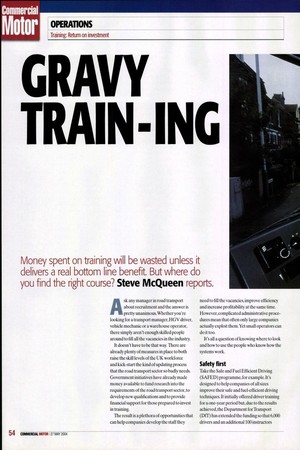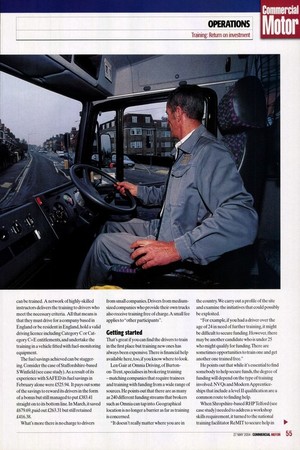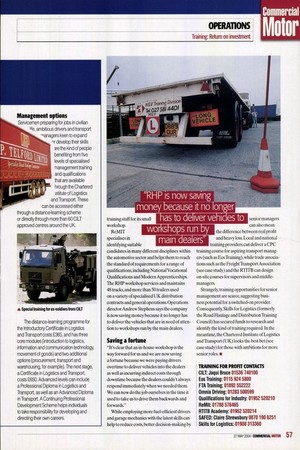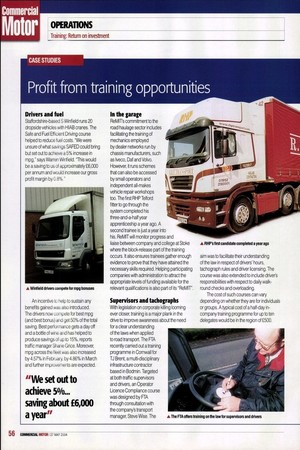GRAVY TRAIN !NG
Page 56

Page 57

Page 59

Page 58

If you've noticed an error in this article please click here to report it so we can fix it.
Money spent on training will be wasted unless it delivers a real bottom line benefit. But where do
you find the right course? Steve McQueen reports.
Ask any manager in road transport about recruitment and the answer is pretty unanimous. Whether you're looking for a transport manager, HGV driver, vehicle mechanic or a warehouse operator, there simply aren't enough skilled people around to fill all the vacancies in the industry.
It doesn't have to be that way. There are already plenty of measures in place to both raise the skill levels of the UK workforce and kick-start the kind of updating process that the road transport sector so badly needs. Government initiatives have already made money available to fund research into the requirements of the road transport sector, to develop new qualifications and to provide financial support for those prepared to invest in training. The result is a plethora of opportunities that can help companies develop the staff they
need to fill the vacancies, improve efficiency and increase profitability at the same time. However, complicated administrative procedures mean that often only large companies actually exploit them, Yet small operators can do it too.
It's all a question of knowing where to look and how to use the people who know how the systems work. Safety first Take the Safe and Fuel Efficient Driving (SAFED) programme, for example. It's designed to help companies of all sizes improve their safe and fuel-efficient driving techniques. It initially offered driver training for a one-year period but, due to the results achieved, the Department for Transport (DfT) has extended the funding so that 6,000 drivers and an additional 100 instructors
can be trained. A network of highly-skilled instructors delivers the training to drivers who meet the necessary criteria. All that means is that they must drive for a company based in England or be resident in England, hold a valid driving licence including Category C or Category C+E entitlements, and undertake the training in a vehicle fitted with fuel-monitoring equipment.
The fuel savings achieved can be staggering. Consider the case of Staffordshire-based S Winfield (see case study).As a result of its experience with SAFED its fuel savings in February alone were £525.94. It pays out some of the savings to reward its drivers in the form of a bonus but still managed to put £383.41 straight on to its bottom line. In March, it saved £679.69, paid out £263.31 but still retained £416.38. What's more there is no charge to drivers
from small companies. Drivers from mediumsized companies who provide their own trucks also receive training free of charge.A small fee applies to "other participants". Getting started
That's great if you can find the drivers to train in the first place but training new ones has always been expensive.There is financial help available here, too, if you know where to look.
Len Gair at Omnia Driving, of Burtonon-Trent, specialises in brokering training — matching companies that require trainees and training with funding from a wide range of sources. He points out that there are as many as 240 different funding streams that brokers such as Omnia can tap into. Geographical location is no longer a barrier as far as training is concerned. "It doesn't really matter where you are in
the country. We carry out a profile of the site and examine the initiatives that could possibly be exploited.
"For example, if you had a driver over the age of 24 in need of further training, it might be difficult to secure funding. However, there may be another candidate who is under 25 who might qualify for funding.There are sometimes opportunities to train one and get another one trained free."
He points out that while it's essential to find somebody to help secure funds, the degree of funding will depend on the type of training involved. NVQs and Modern Apprenticeships that include a level II qualification are a common route to finding help. When Shropshire-based RHP Telford (see case study) needed to address a workshop skills requirement, it turned to the national training facilitator ReMIT to secure help in 110' training staff for its small
workshop. ReMIT specialises in identifying suitable
candidates in many different disciplines within the automotive sector and helps them to reach the standard of requirements for a range of qualifications, including National Vocational Qualifications and Modern Apprenticeships. The RHP workshop services and maintains 48 trucks, and more than 50 trailers used on a variety of specialised UK distribution contracts and general operations. Operations director Andrew Stephens says the company is now saving money because it no longer has to deliver the vehicles that are in need of attention to workshops run by the main dealers. Saving a fortune
"It's clear that an in-house workshop is the way forward for us and we are now saving a fortune because we were paying drivers overtime to deliver vehicles into the dealers as well as incurring indirect costs through downtime because the dealers couldn't always respond immediately when we needed them. We can now do the job ourselves in the time it used to take us to drive them backwards and forwards." While employing more fuel-efficient drivers and garage mechanics with the latest skills can help to reduce costs, better decision-making by senior managers can also mean the difference between real profit and heavy loss. Local and national training providers can deliver a CPC
training course for aspiring transport managers (such as Eos Training), while trade associations such as the Freight Transport Association (see case study) and the RITIB can design on-site courses for supervisors and middlemanagers. Strangely, training opportunities for senior management are scarce, suggesting business potential for a switched-on provider. Consequently, Skills for Logistics (formerly the Road Haulage and Distribution Training Council) has secured funds to research and identify the kind of training required. In the meantime, the Chartered Institute of Logistics and Transport (UK) looks the best bet (see case study) for those with ambitions for more senior roles. • Drivers and fuel
Staffordshire-based S Winfield runs 20 dropside vehicles with HIAB cranes. The Safe and Fuel Efficient Driving course helped to reduce fuel costs. "We were unsure of what savings SAFED could bring but set out to achieve a 5% increase in mpg," says Warren Winfield. "This would be a saving to us of approximately £6,000 per annum and would increase our gross profit margin by 0.8%."
An incentive to help to sustain any benefits gained was also introduced. The drivers now compete for best mpg (and best bonus) and get 50% of the total saving. Best performance gets a day off and a bottle of wine and has helped to produce savings of up to 15%, reports traffic manager Shane Grice. Moreover, mpg across the fleet was also increased by 4.57% in February, by 4.86% in March and further improvements are expected. In the garage ReMIT's commitment to the road haulage sector includes facilitating the training of mechanics employed by dealer networks run by chassis manufacturers, such as Iveco, Daf and Volvo. However, it runs schemes that can also be accessed by small operators and independent all-makes vehicle repair workshops too. The first RHP Telford fitter to go through the system completed his three-and-a-half year apprenticeship a year ago. A second trainee is just a year into
his. ReMIT will monitor progress and liaise between company and college at Stoke where the block-release part of the training occurs. It also ensures trainees gather enough evidence to prove that they have attained the necessary skills required. Helping participating companies with administration to attract the appropriate levels of funding available for the relevant qualifications is also part of its "ReMIT'. Supervisors and tachographs With legislation on corporate killing looming ever closer, training is a major plank in the drive to improve awareness about the need for a clear understanding of the laws when applied to road transport. The FTA recently carried out a training programme in Cornwall for TJ Brent, a multi-disciplinary infrastructure contractor based in Bodmin. Targeted at both traffic supervisors and drivers, an Operator Licence Compliance course was designed by FTA through consultation with the company's transport manager, Steve Wise. The
aim was to facilitate their understanding of the law in respect of drivers' hours, tachograph rules and driver licensing. The course was also extended to include driver's responsibilities with respect to daily walkround checks and overloading.
The cost of such courses can vary depending on whether they are for individuals or groups. A typical cost of a half-day incompany training programme for up to ten delegates would be in the region of £500. Management options Servicemen preparing for jobs in civilian life, ambitious drivers and transport managers keen to expand gr develop their skills are the kind of people benefiting from five levels of specialised management training and qualifications that are available hrough the Chartered lstitute of Logistics and Transport. These
can be accessed either through a distance-learning scheme or directly through more than 60 CILT approved centres around the UK.
The distance-learning programme for the Introductory Certificate in Logistics and Transport costs £365, and has three core modules (introduction to logistics, information and communication technology, movement of goods) and two additional options (procurement, transport and warehousing, for example). The next stage, a Certificate in Logistics and Transport, costs £650. Advanced levels can include a Professional Diploma in Logistics and Transport, as well as an Advanced Diploma in Transport. A Continuing Professional Development Scheme helps individuals to take responsibility for developing and directing their own careers. TRAINING FOR PROFIT CONTACTS CILT: Jaqui Bruce 01536 740100 Eos Training: 0115 924 5800 FTA Training: 01892 552222 Omnia Driving: 01283 500599 Qualifications for Industry: 01952 520210 ReMit: 01788 576465 RTITB Academy: 01952 520214 SAFED: Claire Shrewsbury 0870 190 6251 Skills for Logistics: 01908 313360






























































































































































































